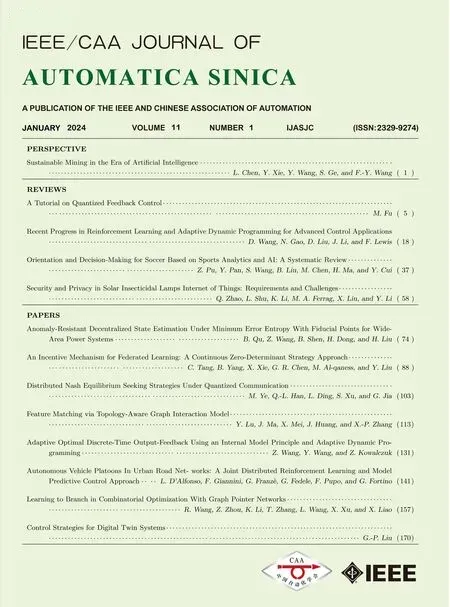Protocol-Based Non-Fragile State Estimation for Delayed Recurrent Neural Networks Subject to Replay Attacks
Fan Yang , Hongli Dong ,,,Yuxuan Shen , Xuerong Li , and Dongyan Dai
Dear Editor,
This letter focuses on the protocol-based non-fragile state estimation problem for a class of recurrent neural networks (RNNs).With the development of communication technology, the networked systems have received particular attentions.The networked system brings advantages such as easy to implement, high flexibility as well as low cost, and also has disadvantages such as limited bandwidth of the communication network which lead to networked-induced phenomena [1], [2].To alleviate the network-induced phenomena, communication protocols have been introduced in the communication networks of the networked systems [3], [4].As a widely used communication protocol in real practice, the round-robin (RR) protocol has received research interest and the state estimation problem under the RR protocol is an on-going hotspot in the area of signal processing [5].Nevertheless, for the RNNs, the corresponding RR protocolbased state estimation problem still needs further research effort which is the first motivation of this letter.
On the other hand, in the networked systems, the signals are prone to be attacked when transmitted through the wireless networks.In general, the cyber attacks can be categorised into three types, namely,denial-of-service attacks, deception attacks, and replay attacks[6]–[8].Among others, the replay attack has its distinctive characteristic [9].In the replay attack, the attacker first eavesdrops the historical data transmitted in the network and saves the data in a storage space.Then, the attacker randomly replays the saved data to the system.The replay attacks can destroy the performance of the system even without any prior information of the system.Furthermore, the replay attack is difficult to be detected.Therefore, the state estimation problem under replay attack is of great significance.
Based on the previous analysis, this letter studies the problem of protocol-based non-fragile state estimation for delayed RNNs subject to replay attacks.Two important questions to be addressed are:1) How to build a suitable mathematical model to describe replay attacks? and 2) How to address the impact of the RR protocol and the replay attacks on the state estimation performance? The main contributions of this letter are that: 1) The replay attacks considered satisfies engineering practice; 2) A new mathematical model is designed to describe the replay attacks; and 3) The effect of the RR protocol and the replay attacks is considered and a non-fragile estimator is designed to ensure the desired performance.
Problem statement: Consider an-neuron delayed RNNs as follows:


In this letter, we assume that the attacker has limited energy.Note that the replay attack costs a certain amount of energy.Therefore, the number of consecutive replay attacks is limited.By introducing a variable
it iseasilyknown thatds(ζ)is related to the numberofconsecutive replay attacksand thereforeds(ζ)≤d?s.It is worthnotingthatd?sis hard to be obtained in practical application.Fortunately,d?sis not required in the proposed algorithm.
Considering the influence of the RR protocol and the replay attacks, the actual signal received by the estimator is
which is rewritten in the following compact form:
where
By letting
we have
Further denoting
one has
where
In this letter, the non-fragile state estimator is designed as follows:

where
Definition 1: The system (6) is exponentially mean-square stable if there exist scalars γ >0 and 0 <δ<1 such that
This letter focuses on design a non-fragile state estimator for delayed RNNs (1) such that the following conditions are satisfied:
1) Forv(ζ)=0, the augmented system (6) is exponentially meansquare stable.
2) When the initial condition is zero, for a known disturbance attenuation level ν >0 and all nonzerov(ζ), η (ζ) satisfies
Main results:

where
Moreover, the gain matrix is determined by
Proof: A Lyapunov functional of the following form is established:
where
Calculating the difference ofV(ζ) and noting Assumption 1, we obtain
where
By applying Schur complement lemma, we derive that

Numerical example: Consider a 2-neuron delayed RNNs (1) with
The activation functiong(x(ζ))=tanh(4x(ζ)).rˉ1=1,rˉ2=3.Fig.1 is the error between the true states and the estimated states.Fig.2 shows the instants when replay attacks occur.Fig.3 expresses the norm of the estimation errore(ζ).

Fig.1.The error between true states and estimated states.
Conclusion: In this letter, we have studied the protocol-based nonfragile state estimation problem of delayed RNNs under replay attacks.While ensuring exponentially mean square stability of the system, theH∞performance index has been satisfied.Then, by using matrix analysis technique, the estimator gain has been solved.Finally, the effectiveness of the proposed estimation method is verified by numerical simulation.

Fig.2.The instants of replay attacks occurred.

Fig.3.The norm of the estimation error e (ζ).
Acknowledgments: This work was supported in part by the National Natural Science Foundation of China (U21A2019,61933007) and the Hainan Province Science and Technology Special Fund (ZDYF2022SHFZ105).
 IEEE/CAA Journal of Automatica Sinica2024年1期
IEEE/CAA Journal of Automatica Sinica2024年1期
- IEEE/CAA Journal of Automatica Sinica的其它文章
- Sustainable Mining in the Era of Artificial Intelligence
- Distributed Optimal Formation Control for Unmanned Surface Vessels by a Regularized Game-Based Approach
- Fixed-Time Consensus-Based Nash Equilibrium Seeking
- Control of 2-D Semi-Markov Jump Systems: A View from Mode Generation Mechanism
- Autonomous Recommendation of Fault Detection Algorithms for Spacecraft
- An Incentive Mechanism for Federated Learning: A Continuous Zero-Determinant Strategy Approach
